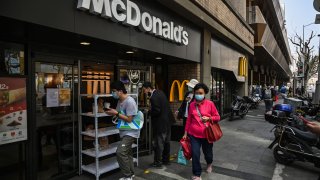
- Mainland China reported for Wednesday a second-straight day of declines in new confirmed Covid-19 cases.
- The omicron wave is "more similar to the power shortage episode from late last year," said Dan Wang, Shanghai-based chief economist at Hang Seng China. She was referring to abrupt factory power cuts in the fall that temporarily affected production.
- The supply chain shocks are relatively light so far, but the primary economic impact is on consumer spending and the services industry, said Bruce Pang, head of macro and strategy research at China Renaissance.
BEIJING — As China tackles its worst Covid-19 outbreak since the initial phase of the pandemic, consumption looks set to be hit the hardest while factories find ways to keep producing.
Mainland China reported for Wednesday a second-straight day of declines in new confirmed cases.
The 1,226 new locally transmitted cases reported for the day is only the lowest since Friday, when the new daily case count was a far lower 476, according to National Health Commission data. Mainland China has not reported new deaths from the latest wave of Covid cases, and those numbers are still well below that of other major countries.
Get a weekly recap of the latest San Francisco Bay Area housing news. Sign up for NBC Bay Area’s Housing Deconstructed newsletter.
The omicron wave is "more similar to the power shortage episode from late last year," said Dan Wang, Shanghai-based chief economist at Hang Seng China. She was referring to abrupt factory power cuts in the fall that temporarily affected production.
This time around, Wang expects factories to be affected for at most two weeks, shorter than in early 2020 when it took some regions several weeks to reopen. "There is risk that this might come back again and again and again," she said. "If that's the case then it will have a lasting impact. But if it's just this month we wouldn't feel much pain."
After suspending local operations Monday, Apple supplier Foxconn said Wednesday it had partially resumed production in Shenzhen at factory campuses that also include employee housing.
Money Report
Shipping giant Maersk said Wednesday in an online customer advisory that terminals in major Greater China ports "remain business as usual including vessel operation, yard handling and gate-in & out."
However, the company noted that some depots for transporting goods through Shenzhen have been closed since Tuesday, while warehouses are closed for the week.
Covid testing requirements for truck drivers and stricter road control between Shenzhen and nearby cities means trucking services in the area will likely "be severely impacted by 30%," Maersk said.
Analysis from Bank of America Securities earlier this week also found a muted impact from Covid on supply chains, including autos and semiconductors.
More drags on consumer spending
The supply chain shocks are relatively light so far, but the primary economic impact is on consumer spending and the services industry, said Bruce Pang, head of macro and strategy research at China Renaissance.
Not only is there an impact on services industries that rely on in-person and social gatherings, especially catering, Covid suppresses people's confidence and expectations for spending, he said. If they "don't know when the pandemic will end, they won't dare to spend money, and will prudently save."
He expects retail sales will rise by about 7% this year.
Consumer spending has remained sluggish since the pandemic began. Data for January and February released this week showed retail sales grew by 6.7% during those two months from the same period a year ago, a significant pickup from December and beating analysts' expectations.
Chinese authorities' initial reaction to new Covid cases has typically been to restrict travel as well as isolating and quarantining confirmed cases or contacts. Authorities restrict travel based on exposure to designated medium or high-risk districts, which can sometimes be as small as a single building or office park.
The mainland added three high-risk districts on Wednesday, for a total of 23, according to state media. That figure had fallen to zero as recently as Feb. 18, reports showed.
Other economic factors
Consumption and any impact from Covid is just one aspect of China's economy, whose growth was already slowing before the latest wave of omicron cases. The massive real estate sector has struggled following Beijing's efforts to reduce developers' reliance on debt, while commodity prices have surged, especially after Russia invaded Ukraine in late February.
"Factories are also closing down for different reasons. It's not just Covid," Hang Seng China's Wang said, noting many had closed before the latest outbreak due to high raw material costs and price controls on end products like food and gas.
Rising production costs and inability to raise prices for consumers would cut into profits, or even eliminate them.
Tesla suspended production at its Shanghai factory on Wednesday and Thursday without giving a specific reason, Reuters reported, citing an internal document. The electric car company did not immediately respond to a CNBC request for comment on the report.
This week, Tesla CEO Elon Musk warned in a tweet that "Tesla & SpaceX are seeing significant recent inflation pressure in raw materials & logistics."
— CNBC's Sam Shead contributed to this report.






